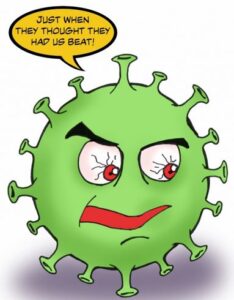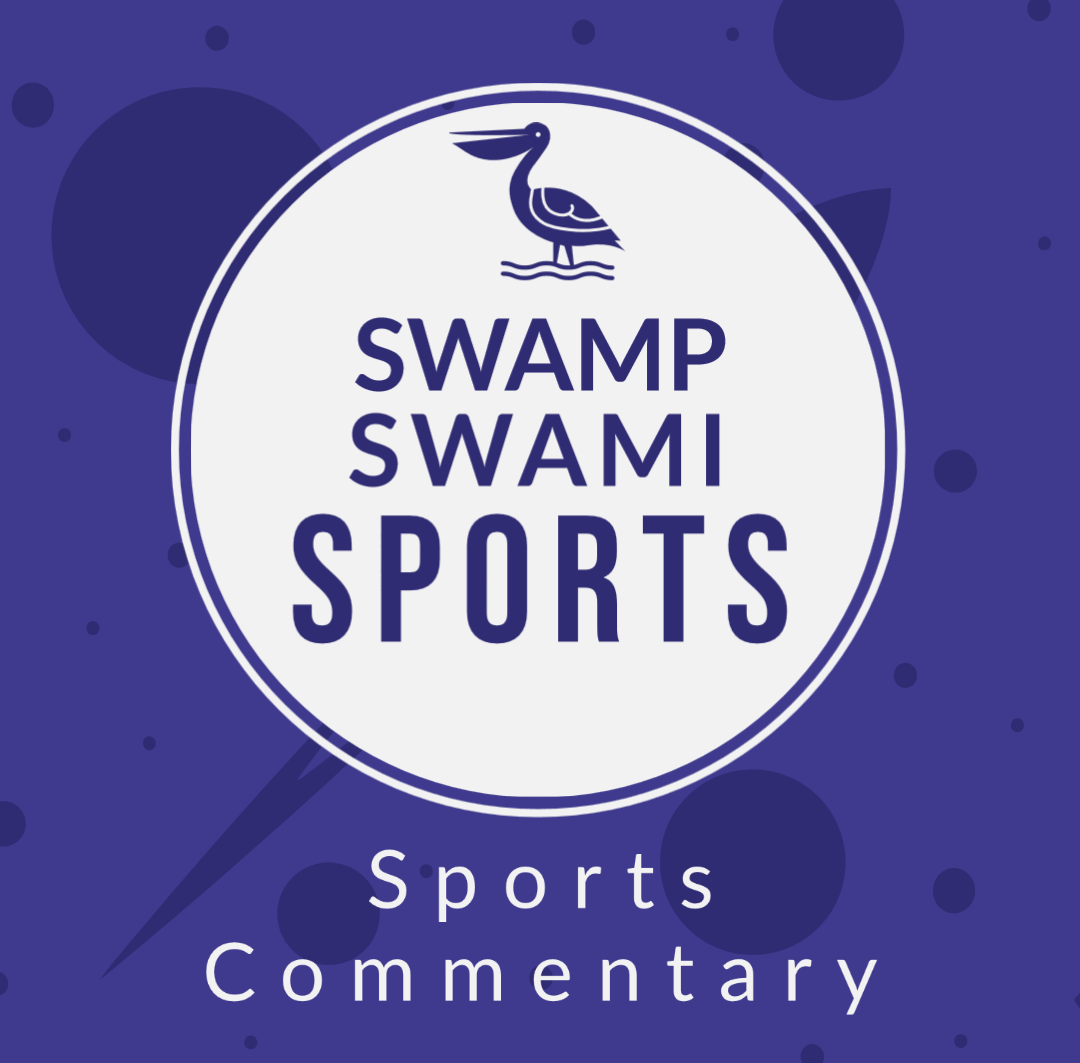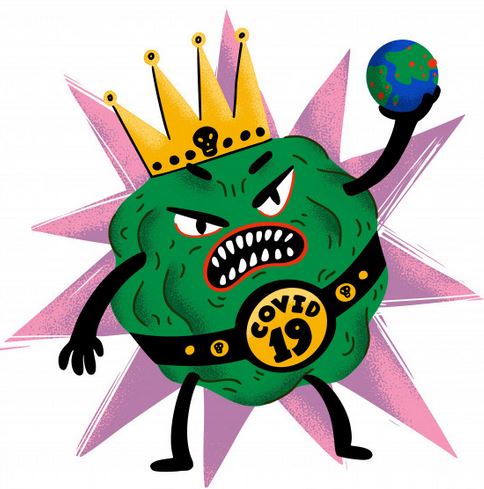Podcast: Play in new window | Download
Subscribe: RSS
Do you remember watching those Godzilla movies of our youth? In nearly story, Godzilla seems to appear out of nowhere to inflict untold damage and upset the lives of the people who are affected by his presence.
Just when you thought it was almost safe to emerge from COVID hiding, he’s ba-a-a-ck!

Yes, we were able to get most of this fall’s college football season completed in 2021. In addition, the never-ending saga of the COVID-19 related issues had artfully been avoided by the most lucrative sports league in America, the National Football League.
Early season television ratings for all football games have climbed back to pre-COVID levels as viewers at home (along with fans in the stands) celebrated the return of America’s favorite fall sport. Football had just started to look as if it was returning to normal once again.
But then, all of a sudden, the COVID Monster’s latest movie was released over the past few weeks to inflict more mayhem across the country.

With the advent of this new Omicron variant of the COVID Monster spreading faster than I can apply grape jelly onto my peanut butter sandwich, the NFL is now being forced to dance with this ornery virus once again just as it enters the home stretch of the football season.
Three of last weekend’s 16 games were postponed and pushed back to as late as Tuesday to allow the teams a chance to find enough healthy players able to suit-up.
Each new day brings an additional group of pro football players who have tested positive during this newest COVID outbreak. Since well over 90% of the NFL’s players had already received COVID vaccinations, the league and the players union is working together to shorten the time which players must be kept off the field after receiving a positive test.
Even the coaches are coming down with this Omicron variant. Last weekend, New Orleans Saints head coach Sean Payton was not on-hand to watch his team shut-out Tom Brady’s Tampa Bay Buccaneers 9-0 and move back into possible playoff contention at 7-7 with three games to go in this overly-long 17 game NFL season.
As soon as Coach Payton was being cleared to return this weekend, the Saints will be without quarterbacks Taysom Hill and Trevor Simien were put onto the COVID-19 list and unavailable for a key Monday night game against Miami in the Superdome.
New Orleans was so desperate for a quarterback this week that they dialed-up retired legend Drew Brees to check on his willingness to make a brief comeback. Brees politely declined, and the Saints eventually signed veteran Blake Bortles to join the team. The Saints will start rookie Ian Book (Notre Dame) with Bortles serving as a valuable back-up.
The Saints situation is not dissimilar to most other teams across the NFL this week. Key players on a number of NFL teams are being sidelined by positive tests and mandatory waiting periods to return to the field.
This problem is affecting nearly every sport – both college and professional.
The National Hockey League took a more dramatic approach to dealing with the new COVID outbreak as it shut the entire league down this week. The number of available hockey players plummeted and made scheduling extremely difficult. The league stopped all games this past Wednesday with plans to return to the ice this coming Tuesday. The NHL and its players union agreed this week not to allow players to participate in February’s Beijing Winter Games in China. The hockey league will utilize that time to catch-up on this month’s cancelled games and finish its 82-game regular-season schedule. Maybe.
The NBA hasn’t been immune to this Omicron issue, either. The league likes to showcase itself on Christmas Day every season with a slate of nationally televised games all day long. The NBA is trying to woo sports fans toward basketball as the football season comes to a close.
The Boston Celtics were without eight players on Saturday’s Christmas Day game against Milwaukee. Kevin Durant was among seven basketball players for the Brooklyn Nets who were ruled-out of a Christmas Day televised match-up with the Los Angeles Lakers.
Speaking of basketball and COVID, there are 62 college basketball teams which have temporarily paused their seasons (as of Sunday, December 26, 2021) due to the return of the COVID Monster. If there is any good news within the bad, the college basketball teams are getting an extended break from school and the basketball court to hopefully stay safe and enjoy the holiday season.
Other college sports have been affected by this COVID Monster, too. The college football bowl season has seen a number of changes due to the latest COVID drama. Last Friday’s bowl game in Honolulu between the home town Hawaii Rainbow Warriors and the Memphis Tigers was cancelled due to an increasing number of players being unavailable due to COVID (and injuries and transfers).
Texas A&M just opted-out of its appearance in this Friday’s upcoming Gator Bowl game against Wake Forest citing numerous COVID issues and player injuries. Fortunately, the 5-7 Rutgers Scarlet Knights accepted a bid to replace the Aggies and play in the game.
On Sunday, two more college bowl games were scrubbed for the upcoming week due to a lack of available and healthy players. The Military Bowl (played in Annapolis, Maryland) and Fenway Bowl (yes, played in Boston’s Fenway Park) were cancelled because the Boston College Eagles and Virginia Cavaliers have cited a combination of coronavirus issues, season-ending injuries, opt-outs and transfers.
By the way, keep an eye on how many teams are blaming “injuries, opt-outs, and transfers” in addition to COVID issues. We’ll talk about those issues sometime soon.
Right now, this lurking COVID monster has the college football world sweating-out what may happen before kickoff of this Friday’s national semifinal games. If either of the two scheduled match-ups (Alabama vs. Cincinnati and Georgia vs. Michigan) should be forfeited by one team lacking enough available players, the opposing team will receive an automatic pass into the championship game in early January. If, for some reason, three of the four teams should happen to forfeit their semifinal games this Friday, the one remaining team will be declared this year’s national champion.
I doubt that America’s college football fans will be very happy to have the football season decided in this manner.

Let’s now revisit the NFL’s COVID issues. What if more players become unavailable entering January and start to have a larger negative effect on the conclusion of the NFL season?
The television partners of the pro football league already invest incredible sums of money primarily to capture viewers during the January playoffs when much of America is stuck inside due to cold weather – not just COVID. If the NFL playoffs should require to be significantly delayed, the networks may be knocking on the NFL’s door to demand sizable refunds if games must be played on a Monday or Tuesday featuring smaller potential television audiences.
Can you imagine the confusion nationwide if the NFL’s annual Super Bowl game (scheduled this year on February 13 – a lucky number, eh?) is unable to be played during its traditional Sunday night TV slot due to player health issues? Would the NFL wait for another full week to play the game or just go ahead and play it on the first weekday when the players are finally cleared to go?
The next few weeks are likely to be filled with a lot of surprises for the sports world – thanks to the reappearance of the COVID Monster that just won’t go away!

